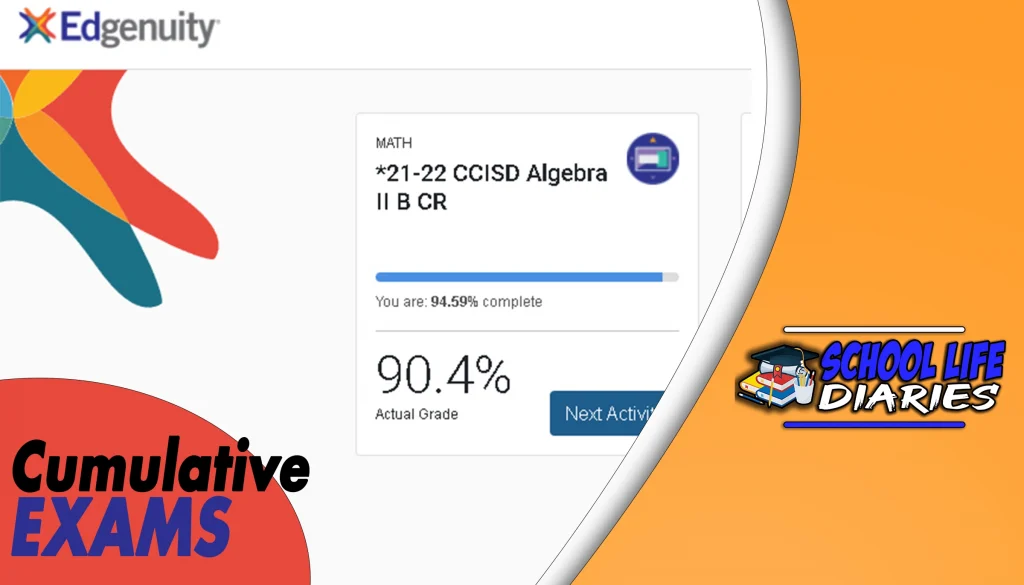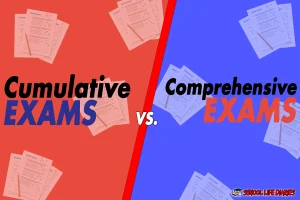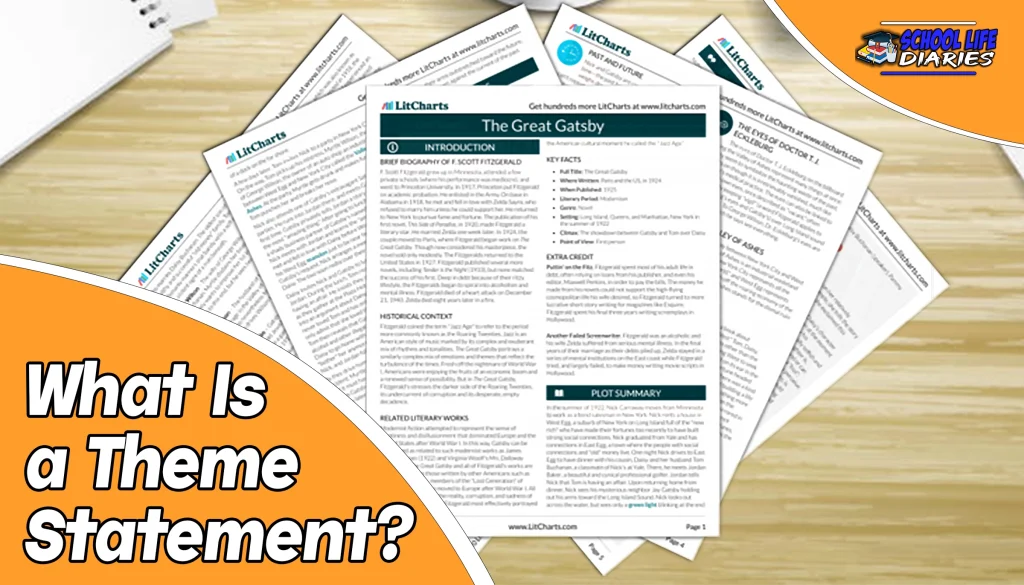Edgenuity offers a wide range of cumulative exams, ranging from simple multiple-choice quizzes to longer and more comprehensive exams. A cumulative exam on Edgenuity is an incredibly useful way for students to assess their overall understanding of the material they have learned in a given course. It involves synthesizing information from multiple sources and topics into a cohesive exam that can be used as a measure of understanding. It allows them to identify areas where they may need additional practice or further instruction. The exam also provides instructors with a more comprehensive understanding of the student’s overall mastery of the subject material.
How Do You Study for a Cumulative Exam?
Studying for a cumulative exam can be a daunting task. Here are some tips to help you make the most of your efforts and get the best possible score on the exam:
1. Ensure You Have All Notes:
Before beginning your study session for a cumulative exam, it is important to make sure that you have all of the notes and other material that you need. This includes lecture notes, assignments, and any extra materials you may have been given throughout the semester. Having all of these materials handy can help to ensure that your study session is as productive as possible.
2. Include Studying in Your Routine:
To make sure that you are giving yourself enough time to study for your cumulative exam, it is important to include studying in your regular daily or weekly routine. This can help you stay on track and give yourself the time needed to go over all of the material that will be tested on the exam.
3. Make Summary Notes as You Study:
As you go through your notes and other study materials, it can be helpful to make summary notes that you can refer back to as you are studying. This will save time and help remind you of the key points that need to be reviewed before taking your exam. Having these notes handy can also help when it comes time to answer questions on the cumulative exam.
4. Diversify Your Study Methods:
Studying for a cumulative exam can be tedious and it is important to find ways to break up your study session so that you don’t get overwhelmed. Try different methods such as flashcards, making mind maps or diagrams, or even breaking the material into smaller sections and focusing on one section at a time.
5. Take Exercises as You Study:
As you are studying, it can be helpful to take breaks and do physical activities that will help clear your mind and get your body moving. This will give you a break from focusing on the material and also help keep your energy levels up for when it’s time to get back to studying.
6. Get a Study Partner:
Find someone who is also taking the same cumulative exam and work together to review the material. This can be helpful because it allows you both to share ideas and ask each other questions about concepts that might not make sense. It can also help motivate each of you to stay focused and on track with your studying.
7. Utilize Second Chances:
If you don’t pass your cumulative exam the first time, don’t get discouraged. Most schools give students the opportunity to retake cumulative exams for better grades. Take advantage of this to improve your score, and make sure to review all of your notes from the course before taking it again so that you can make the most of your second chance.
Are Cumulative Exams Good?
Yes, Cumulative exams are a great way to assess how well students have retained the information they were taught over the course of a semester. Research has consistently shown that students who take cumulative exams tend to score higher if they take them after the course is finished. This is because it tests their ability to recall and apply what they’ve learned, rather than just their ability to cram for a single test.
They also provide a better means of evaluating student learning than traditional multiple-choice or essay tests alone. With cumulative exams, students must demonstrate mastery of the material over the entire semester, which results in a more comprehensive assessment. It’s no surprise that cumulative exams are becoming an increasingly popular choice for both teachers and students.
Is a Cumulative Exam a Final?
Yes, A cumulative exam, also known as a cumulative test or final exam, is a type of assessment that covers the material learned throughout a course or academic term. It typically takes place at the end of the semester to assess a student’s knowledge and comprehension of the subject matter.
What Does a Non-Cumulative Exam Mean?
A non-cumulative exam is an evaluation method where previous material is not taken into consideration. This means that the questions on the test are only related to specific topics covered during the current course, and the material will not be cumulative of past lessons or material. This type of exam focuses solely on more recent information, emphasizing a student’s understanding of the material rather than their ability to recall facts and information from past classes.
Non-cumulative exams are beneficial for students who have difficulty retaining information, as it reduces the test’s difficulty by removing the need for a student to remember facts or content from previous courses. It allows them to focus on skills, such as understanding concepts, analyzing data, and solving problems.
Final Exams: Understand Comprehensive vs Cumulative Exams
Comprehensive exams and cumulative exams are two different types of tests that students can face during their educational journey. Comprehensive exams are typically more comprehensive than cumulative exams and may involve multiple days of testing, or even a few weeks depending on the program and institution. Students preparing for comprehensive exams need to have an in-depth understanding of the topics covered during their program as well as any related material that may be applicable. Comprehensive exams also tend to be more rigorous than cumulative exams in terms of the weight given to questions, as well as the expectations for accuracy and detail.
What Is A Comprehensive Exam?
A Comprehensive Exam is an academic assessment used to evaluate the knowledge and competencies of a student prior to graduation. Unlike traditional exams, which test a student’s ability to recall facts, comprehensive exams are designed to assess a student’s overall mastery of their field of study. They require students to demonstrate an in-depth understanding of their subject matter by applying their knowledge to complex problems.
What Is A Cumulative Exam?
A cumulative exam is a type of assessment that tests students on their knowledge and understanding of course material learned over a certain period of time, typically an academic term or semester. The exam usually contains questions from the entire semester’s curriculum, rather than being based solely on what has been taught in recent weeks.
What Are The Main Differences?
Cumulative Exam | Comprehensive Exam | |
| Timing: | A cumulative exam is typically taken after each semester or course unit. | A comprehensive exam usually takes place at the end of the entire degree program. |
| Material Covered: | Cumulative exams generally cover material from the entire semester or course unit. | Comprehensive exams encompass much more material and often require students to demonstrate a broad understanding of the entire program. |
| Format: | Cumulative exams are usually taken in one large test. | Comprehensive exams may be split into multiple tests or presentations. |
| Grading: | Cumulative exams are typically graded out of a certain number of points. | Comprehensive exams may be either pass/fail or graded on a curve. |
| Preparing for the Exam: | For cumulative exams, it is generally enough to review the material from each unit or semester in order to do well. | For comprehensive exams, students should review the entire program and often must demonstrate mastery of certain topics. |
| Outcome: | Cumulative exams allow students to show their understanding of a particular unit or semester. | Comprehensive exams can be used to assess whether or not the student has a thorough understanding of all materials covered in their degree program. |
| Impact: | Cumulative exams are important for measuring progress over the course of a degree program. | Comprehensive exams provide an indicator of overall mastery which can help determine if a student has completed all the requirements for graduation. |
Are Students Motivated by Cumulative Exams?
Yes, students can be motivated by cumulative exams. Cumulative exams can provide a strong incentive to review and study material, as they demonstrate to students that their hard work and dedication are appreciated and rewarded. Through cumulative exams, students are given the opportunity to demonstrate their mastery of the subject matter, which can contribute to increased motivation levels.
Advantages of Cumulative Exams
1. Cumulative exams help ensure that students are mastering the material. By testing on the content learned throughout the term, rather than just at the end, students have more opportunities to understand and retain the material.
2. Cumulative exams allow for greater depth in learning. Students can focus on the details of a particular topic rather than having to learn a broad range of concepts in a short period of time.
3. Cumulative exams help students better recognize patterns and relationships among topics. By repeatedly testing the same material, students can understand how one concept relates to another, creating a more meaningful connection between topics.
4. Cumulative exams require more self-motivation from the student, as they are tasked with mastering each topic before moving on to the next one. This encourages students to take their studies seriously and keeps them accountable for their progress throughout the course.
5. Cumulative exams can be used to identify areas of weakness in a student’s understanding of the material. This can help instructors provide additional instruction and resources to students in those areas.
6. Cumulative exams are typically shorter and more focused than a typical final exam. This makes them less intimidating and allows students to concentrate their energy on mastering the material rather than worrying about time constraints.
Disadvantages of Cumulative Exams
1. Cumulative exams may be unfair because they are often graded on a curve. This means that some students have to score higher than their peers in order to pass the exam. The grading system can also unintentionally reward those who study more or have better test-taking skills.
2. Cumulative exams discourage students from taking courses outside their major. Students may choose to focus on their major courses in order to get a better grade than their peers, instead of exploring other topics that may be interesting or beneficial for them. This can limit the student’s learning experience and lead to an unbalanced education.
3. Cumulative exams can penalize students who change majors. They may find themselves behind their peers who have been focusing solely on their major courses all along. This can also result in a lack of knowledge outside of their chosen field, leading to an unbalanced education.
4. Cumulative exams may encourage cheating. Students may be tempted to collaborate with other students or use unauthorized materials as a way to improve their grades. This can also lead to a decrease in academic integrity and an overall decrease in the quality of education.
5. Cumulative exams can be a waste of time and money for both students and universities. Students may spend hours studying for the exam, only to find that their grade does not reflect their effort or knowledge. Universities may have to pay for the materials and resources needed to administer these exams.
6. Cumulative exams can lead students to drop out of their program or university altogether. This is because they may become overwhelmed by the pressure of having to perform well on an exam in order to pass a course or move on to the next level.
Conclusion:
A good Edgenuity cumulative exam can help students retain information learned throughout the school year while also providing teachers with an overview of what students have learned. Edgenuity provides a variety of cumulative exam resources that can help both students and teachers succeed. The cumulative exam is a great way to assess student understanding at the end of a unit and help teachers plan for future instruction. Cumulative exams can also be used as a formative assessment to give students feedback on their learning.






